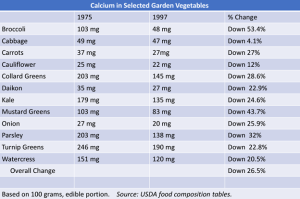Overfed But Undernourished

You’re eating a plant-based diet to maximize your health and protect the planet. But the reality is, grandma and grandpa were much healthier when they were your age than you are today. A major reason is our food supply isn’t as nutrient dense as it used to be. But we’re not talking about processed or even packaged food. We’re talking about fruits, vegetables, grains, and meat. It’s a main reason why people today are overfed but undernourished. Here’s the story.
First, let’s be clear that eating a plant-based diet high in fruits, vegetables, and whole grains is considered to be part of your healthy 100 Year Lifestyle.
Not Perfect
That said, even if you are eating a “perfect” diet, you’re probably lacking in either vitamins or minerals. 92% of Americans are suffering from at least one vitamin or mineral deficiency. And, sadly, it’s a fact that the majority of Americans are not eating a perfect diet.
Science has proven that when nutrient levels are lower, appetite centers in the brain are triggered causing cravings and increased appetite, almost always resulting in weight gain. As if those triggers weren’t enough, low vitamin and nutrient levels make us tired and less likely to be active. The less active we are the more our metabolism is likely to slow down. It’s the trifecta of weight gain.
The Stats
Weight gain, as we all know, affects a large portion of the American population. According to the Food Research & Action Center, 31.6% of U.S. adults are overweight, 39.6% are obese, and 7.7% are severely obese. That means that only 21.1% of the adult population is within the proper, healthy weight range.
Unfortunately, the statistics for children are equally disturbing. According to the National Center for Health Statistics, National Health and Nutrition Examination Survey, “Among children and adolescents ages 2 to 19, about 1 in 6 (16.1%) are overweight, more than 1 in 6 (19.3%) have obesity, and about 1 in 18 (6.1%) have severe obesity.
Overweight and obesity on their own are responsible for all causes of death, high blood pressure, high cholesterol, Type 2 diabetes, coronary heart disease, stroke, and the list goes on.
No Defense
However, the decline in available nutrients in our food creates many problems beyond just weight gain. According to David R. Montgomery, a professor of geomorphology at the University of Washington in Seattle, nutrient decline “is going to leave our bodies with fewer of the components they need to mount defenses against chronic diseases – it’s going to undercut the value of food as preventative medicine.” And, at 100 Year Lifestyle we know it’s clearly not the best way to support your body’s innate intelligence.
Additional health problems directly associated with vitamin and mineral deficiencies, regardless of weight, include:
- Diabetes
- Cancer
- Dementia
- Heart disease
- Stroke
- High blood pressure
- High cholesterol
- Depression
- Fatigue
A Walk Through the Garden – Then and Now
Here’s an example from a study done by Washington State University directly proving what Mr. Montgomery’s talking about:

While recommended daily consumption of calcium varies, the study uses 1000 mg as an average. With that in mind, in 1975, it would have been necessary to consume about 2.13 pounds of broccoli per day to reach the 1,000 mg requirement. In 1997, it would have been necessary to consume 4.6 pounds of broccoli, or 2.14 times as much, to get the same amount of calcium.
And we’re not just talking about calcium. In a study conducted by Professor Donald Davis and his team at the University of Texas at Austin, comparing data for 43 different fruits and vegetables grown between 1950 and 1999, they found there to be a:
- 6% decline in protein content
- 9% decline in phosphorus
- 15% decline in iron
- 15% decline in vitamin C
- 16% decline in calcium
- 18% decline in vitamin A
- 38% decline in vitamin B
Unfortunately, all these years later and we can’t say that we’ve corrected this problem. Research appearing in the January 2022 issue of Foods found that Australia was having similar problems. This is a global problem, and the numbers aren’t getting better.
Next week we’ll continue this article on the state of our food supply and how you can best support your body’s innate ability to heal through education and choosing quality food products.
- SHARE THIS POST







